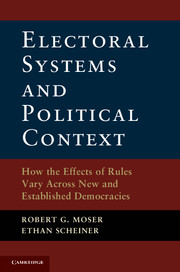 Electoral Systems and Political Context
Electoral Systems and Political Context Book contents
- Frontmatter
- Contents
- Tables and Figures
- Abbreviations
- Glossary of Key Terms
- Acknowledgments and Note on the Online Appendix
- Introduction
- 1 When Do the Effects of Electoral Systems Diverge from Our Expectations?
- 2 Mixed-Member Electoral Systems
- 3 How Democratic Experience and Party System Development Condition the Effects of Electoral Rules on Disproportionality and the Number of Parties
- 4 How Democratic Experience and Party System Development Condition the Effects of Electoral Rules on Disproportionality and the Number of Parties
- 5 Political Context, Electoral Rules, and Their Effects on Strategic and Personal Voting
- 6 How Democratic Experience and Party System Development Condition the Effect of Electoral Rules on Strategic Defection
- 7 Social Diversity, Electoral Rules, and the Number of Parties
- 8 How Political Context Shapes the Effect of Electoral Rules on Women's Representation
- 9 Conclusion
- References
- Index
5 - Political Context, Electoral Rules, and Their Effects on Strategic and Personal Voting
Published online by Cambridge University Press: 05 November 2012
- Frontmatter
- Contents
- Tables and Figures
- Abbreviations
- Glossary of Key Terms
- Acknowledgments and Note on the Online Appendix
- Introduction
- 1 When Do the Effects of Electoral Systems Diverge from Our Expectations?
- 2 Mixed-Member Electoral Systems
- 3 How Democratic Experience and Party System Development Condition the Effects of Electoral Rules on Disproportionality and the Number of Parties
- 4 How Democratic Experience and Party System Development Condition the Effects of Electoral Rules on Disproportionality and the Number of Parties
- 5 Political Context, Electoral Rules, and Their Effects on Strategic and Personal Voting
- 6 How Democratic Experience and Party System Development Condition the Effect of Electoral Rules on Strategic Defection
- 7 Social Diversity, Electoral Rules, and the Number of Parties
- 8 How Political Context Shapes the Effect of Electoral Rules on Women's Representation
- 9 Conclusion
- References
- Index
Summary
In Chapter 4, we began to consider the conditionality of electoral system effects through an analysis of the number of parties in mixed-member systems. We saw that FPTP rules produce their expected effects in established democracies, most notably by constraining the number of parties. At the same time, we saw a very different result under FPTP rules in new democracies, which tended to produce many more parties. We argued that these different outcomes were due to far greater strategic defection in established democracies by candidates and their supporters who faced little chance of success in SMDs, but this argument was merely conjecture; we did not demonstrate the behavior that underlay the different results. To get at these mechanisms, we need to delve more deeply into whether voters and elites in different contexts do, in fact, behave in this way. We need to address the question: Is there, in fact, more strategic defection in established democracies than in new ones? In Chapters 5 and 6, we address this issue of strategic defection under different contexts.
In this chapter, we study votes cast under mixed-member systems to learn more about the factors that shape voting behavior. Our principal aim is to explore the conditions under which voters will be likely to cast strategic ballots, whereby they withdraw support from their preferred candidate in order to affect the race, but our strongest findings in this chapter relate to the personal vote. In the study of mixed-member electoral systems, work on strategic voting is particularly well established. Ticket splitting in which a greater number of votes are cast for large parties in the SMD tier than in the PR tier (and a smaller number of votes are cast for minor parties in SMDs) has been put forward as evidence that voters react strategically to restrictive electoral rules – such as FPTP – that tend to deny representation to minor parties. On this topic, the literature gives substantial attention to strategic voting, but does not account sufficiently for another factor that can drive ticket splitting: the personal vote – additional SMD votes cast for a candidate due to the candidate's personal appeal to voters.
- Type
- Chapter
- Information
- Electoral Systems and Political ContextHow the Effects of Rules Vary Across New and Established Democracies, pp. 121 - 148Publisher: Cambridge University PressPrint publication year: 2012
- 1
- Cited by


